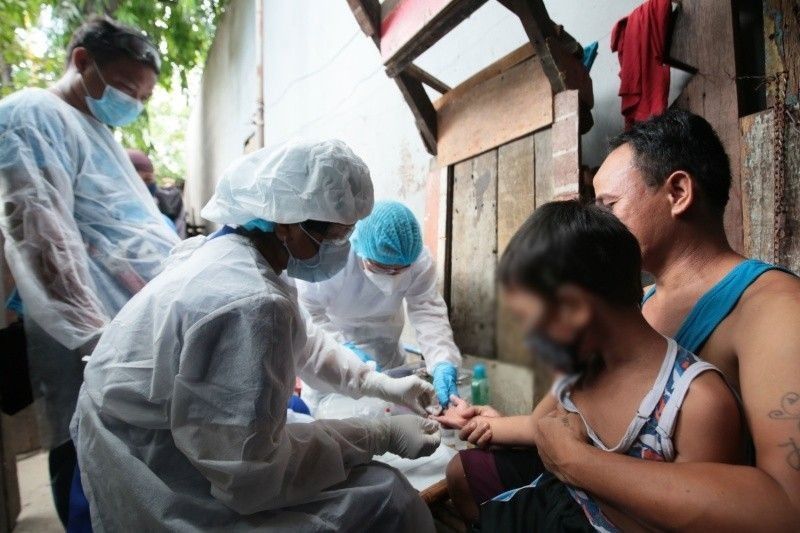Home collection of COVID-19 specimen allowed

MANILA, Philippines — People suspected of having been exposed to the coronavirus could have their specimens collected right at their home for laboratory test, according to the Department of Health (DOH).
In a virtual briefing yesterday, Health Undersecretary Maria Rosario Vergeire said the DOH under Department Circular 2020-0204 allows remote collection of specimens from suspected coronavirus disease 2019 (COVID-19) patients.
Vergeire, however, stressed that only DOH-licensed laboratories are allowed to provide “home service” collection of samples.
“Among these licensed laboratories, if they intend to have these remote collection or… home service, the health care must be with the proper personal protective equipment,” Vergeire said.
“They have to follow guidelines on proper collection. They must notify the DOH if they have this kind of service so that we can monitor,” Vergeire added.
Vergeire said the DOH is strictly monitoring specimen collection as they have received information that unlicensed laboratories are illegally offering remote collection of specimens for COVID test.
Unlicensed laboratories offering remote collection of specimens for such tests face sanctions, Vergeire said.
Rapid test
Cagayan de Oro Rep. Rufus Rodriguez urged the DOH to discourage the use of rapid anti-body test (RAT) to screen people for COVID-19 infection.
“There have been plenty of reports that these rapid tests produce false positive and false negative results,” Rodriguez lamented as RAT “can only detect antibodies, which the body produces in response to an infectious agent such as a virus.”
In authoring House Resolution 1146, he said the DOH should instead promote the use of reverse transcription polymerase chain reaction (RT-PCR) or swab test, which is the “gold standard in COVID-19 testing.”
Rodriguez, chairman of the House of Representatives’ committee on constitutional amendments, said despite RAT’s inaccuracy, many business establishments are still using it to test workers returning to work as the country reopens its economy.
He quoted microbiologist-scientist professor Marilen Balolong from the University of the Philippines-Manila as saying RT-PCR is at least 97 percent accurate, while RAT’s reliability is 30 percent to 80 percent.
Rodriguez said pulmonary and critical care specialist Dr. Anna York Bondoc, a former congresswoman from Pampanga, has called on DOH to stop the use of RAT
He added that Bondoc “believes that wrong clinical decisions made with inaccurate results from rapid tests have been fueling the rise in COVID-19 cases in Metro Manila.
Rodriguez pointed out that RAT has been banned in many countries, including Australia, Dubai and India.
He said the Philippine College of Physicians and the Philippine General Hospital are opposed to rapid testing.
Confirmed COVID cases nationwide surpassed 220,000 as the DOH reported more than 3,000 additional cases of infection yesterday.
From 97 laboratories, the DOH recorded an additional 3,446 confirmed cases, bringing to 220,819 the total number of the people infected with the virus.
But the DOH said the number of those who recovered rose to 157,562 with 165 more patients recovering from the illness.
Of the 3,446 reported cases, DOH said 86 percent or 2,965 occurred within the past 14 days with the National Capital Region (NCR) accounting for 52 percent or 1,528 of the newly recorded cases.
COVID-related fatalities rose to 3,558 with the inclusion of 38 deaths. Thirty-one or 82 percent of the newly reported deaths occurred in August while the rest happened between May and July.
Half or 19 of the newly reported deaths were from NCR, nine from Calabarzon, four from Central Visayas.
Vergeire warned the public against sharing on social media the list containing names of people who tested positive for COVID.
She said sharing in public is considered a personal data breach, which is punishable under the law.
Only concerned healthcare providers, health authorities and DOH partner agencies are allowed to access the personal health information of COVID patients and their identified close contacts.
The DOH also warned the public not to use anti-tuberculosis bacillus Calmette-Guerin (BCG) vaccine as prevention for COVID-19.
Vergeire said there is no sufficient scientific evidence at this time to prove that BCG can be an effective vaccine against COVID.
“We have to wait for results of study being undertaken, but as of now there is no sufficient evidence that would say BCG when given will have good effect,” Vergeire said in a virtual press briefing yesterday.
“As of now it is given to children to prevent tuberculosis and it not being used for COVID yet,” she pointed out.
She said sufficient scientific evidence is needed before the DOH would allow use of any technology against COVID.
Vergeire advised the public not to instantly purchase and use any technology touted in various published articles as an effective prevention for coronavirus disease.
She said clinical trial must first be undertaken for any vaccine and it has to be approved by the Food and Drug Administration (FDA) before distribution and use in the country.
Concerning the Sinovac Biotech, Vergeire said the government has already identified participating hospitals, but everything about the clinical trial is still under discussion.
She said a panel of vaccine experts is still studying the Sinovac vaccine.
- Latest
- Trending




























